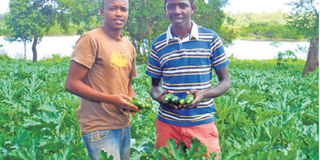Best friends in school and also on the farm

Erick Maingi and Cosmas Kavinda at their farm in Embu County. PHOTO | FELIX MUGENDI
What you need to know:
- The two, who are based in Runyenjes, Embu County, raised Sh200,000 from family and friends to start the venture.
- Currently, they are harvesting between 95kg and 100kg of the crop daily, which they sell at Sh40 per kilo.
After getting a job at a non-governmental organisation as a monitoring and evaluation specialist soon after graduating from university last year, Cosmas Kavinda looked forward to a fruitful career.
However, it was not long before the United States International University graduate, who got a First Class honours degree in International Relations, realised that he had no passion for the job.
“I was working as a monitoring and evaluation assistant officer in an NGO in Nairobi. Every morning I would force myself to wake up and go to work, but I realised that I could not do that for long. I quit last year and went into farming.”
Kavinda, 23, now grows courgette, capsicum (hoho) and coriander, among other crops. He has teamed up with his friend, Erick Maingi, a Business Administration graduate from Mount Kenya University.
“I quit my job two months before being confirmed. I followed my gut feeling that I would earn more money in farming. Besides, I wanted to try something new.”
His move paid off as they now earn more than Sh3,000 daily from the at least 65kg of courgette. They are yet to start harvesting the other crops.
The two, who are based in Runyenjes, Embu County, raised Sh200,000 from family and friends to start the venture.
“We used the money to lease a three-acre piece of land in Ithatha village, Embu and bought seeds, a water tank, and pipes. We planted Seminus hybrid courgette seeds,” says Maingi.
Their farm sits near Ithatha dam, thus, water is not a problem.
Currently, they have planted the crops on two acres and have started tilling the other one acre where they want to plant watermelons and butternuts.
“I come from a village where agriculture is the mainstay. While growing up, I used to have a feeling that I would one day become a farmer. I did not know that I would venture into it after graduating.”
Maingi and Kavinda met in high school and although they studied in separate universities, they remained friends.
“We sold our first produce to a wholesale vegetable seller in Embu Town. She was buying courgette from a farmer in Karatina Nyeri, but agreed to try our produce because we were near. This earned them over Sh4,000.”
The two have 2,000 courgette plants from which they harvest daily. In their first week of harvest, they got 107kg. This increased to 363kg in the second week as the crops flourished.
Currently, they are harvesting between 95kg and 100kg of the crop daily, which they sell at Sh40 per kilo. “To maintain the quality and quantity needed by our clients, we harvest our courgette daily. Buyers prefer young courgette, which we ensure we supply to them,” says Maingi.Maingi and Kavinda are currently working hard to get orders from supermarkets in Embu County, who would give them better prices.
The outlets demand at least 150kg of courgette daily, which they hope to attain once they expand their farm. “Our studies in international relations and business administration are helping us greatly, particularly when it comes to marketing our products andmanaging farm records.”
The two attribute their success to a farmer and a friend, Monica Kabuga, who has been mentoring them.
“We have been visiting her farm regularly to get tips, which we later practise on our farm. Through her advise, we have seen our harvest increase steadily,” says the two.After harvesting the crops, they put them in plastic bags before packing in boxes for transportation to the market. They use a motorcycle which they bought recently for the transport work.
Stephen Njeru, a Horticultural Crop Development Authority officer based in Runyenjes, says courgettes take 45 days to mature.
“Courgettes should be planted at a spacing of about a metre to give them enough space. They also require enough manure and should be sprayed regularly to keep off pests and diseases. The crop has a lifetime of two months,” Njeru says.
Among the challenges they face is poor road network from their farm to Runyenjes town where they sell their produce.
“Our aim is to expand our farm to at least 10 acres and sell the produce to export markets,” Kavinda says.
To the youth, the duo say: “There are many opportunities in farming, you just need to look around keenly to discover them.




